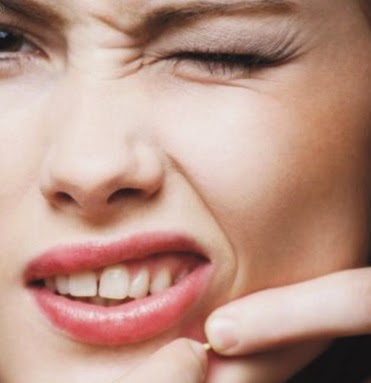All About Acne : Acne is a skin disorder characterized by the eruption of red pimples, blackheads and cysts. It most often affects the face and chest, as well as the back, chest or scalp.
Acne is a reflection of the reactions taking place in the sebaceous glands. Housed in the skin, these glands produce sebum, a lubricating substance. If lack of sebum, the skin is dry and cracked easily. If there is too much, the skin will become oily and acne. In fact, excess oil obstructs the duct of the sebaceous glands. This facilitates the growth of bacteria normally present in the skin: the Propionibacterium acnes bacteria responsible for inflammation (see diagram). When the clogged follicle expands too much, it causes rétentionnelles lesions (blackheads and microkystes).

All About Acne : The symptoms of acne can be treated quite well in adolescents. They are sometimes more difficult to heal in adults.
Who is affected?
In Western countries, acne is very common in adolescents: an estimated 80% to 90% of them are affected at one time or another. Boys are more affected than girls. 10% to 20% of them seek medical attention for this reason. In most cases, acne disappears around age 20 or 30 years, but sometimes it persists, this is called late acne.
Causes
Acne is multifactorial. Here are some things that can contribute to its onset.
Hormonal surge at puberty. At puberty, regardless of gender, sex hormones increase; especially androgens (leading to the development of male sex characteristics). Under the effect of this push, the sebaceous glands produce more sebum. This increased production of sebum creates a fertile ground for the proliferation of Propionibacterium acnes bacteria that feed on;
Hormonal changes in women. Some women see acne pimples appear 2 to 7 days before their menstrual periods. Contraception can also have a positive or negative role: women who start taking some birth control pills containing potentially including acnegenic progestins gestodene type desogestrel, norgestrel, levonorgestrel, norgestrienone, norethisterone, lynestrenol ... can see their acne s' emphasize or, on the contrary, stopping contraception (to become pregnant for example) can also be a purveyor of acne. Pregnancy and menopause can also be responsible;
Disorders of the functioning of the ovaries or adrenal glands. Sometimes acne in women can be attributed to a dysfunction of the ovaries or adrenal glands, but this is exceptional.
Other factors that can cause acne or worsen symptoms. For details, please refer to the Risk Factors section.
Myths
Unlike some ideas circulating, acne is not caused by poor skin hygiene or a great sexual activity;
The power is not considered a cause of acne. However, in some cases, acne can be compounded with one or more specific foods. The association between acne breakouts and milk consumption is low, according to studies.
Complications
Deeper lesions (cysts) can leave scars. It is important to avoid piercing damage, as this can keep acne and is more likely to create scars.
Prolonged many pimples or lesions on the face and body presence can damage the image and self-esteem, especially among adolescents. It can increase stress in social relations. It is often possible to improve the appearance of skin with daily care, as long as acne diminishes or disappears.
Thank you for reading article All About Acne and dont forget to read our previous article about Pimples And Olive Oil.
Thank you for reading article All About Acne and dont forget to read our previous article about Pimples And Olive Oil.



